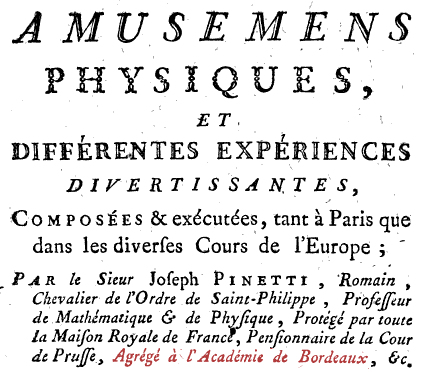On 15 November 1783 the most esteemed illusionist of 18th century performed in France for the first time: Giuseppe Pinetti (1750-1799). The newspapers celebrate its wonders, presented in Fontainebleau at the court of King Louis XVI. To evoke an aura of scientificity around his magic, the Italian artist proclaims himself “professor of mathematics and physics” and puts his performances in a strictly scientific framework.
The poster that announces the shows is an intelligent balance of science and magic: in the wake of the classic science popularizers like Nollet and Charles, Pinetti declares to combine “the useful with the pleasure” and that in his demonstrations the didactic intent goes hand in hand with the recreational one. Recognizing that “the knowledge of the effects made possible by electricity and magnetism and the discovery of diffuse fluids for the atmosphere have made us very demanding and less sensitive towards the performances of those who, in the past [...], tried to evoke the pleasure of amazement and the enchantment of wonder ”, nevertheless he “has found a way to offer new stimuli ”to fans of such experiences“ (1) .
The trick consists in insinuating, in a context of scientific appearance, disturbing elements that transcend any known physical force and that seem to come from a hidden dimension. Pinetti doses the ingredients in unsettling ways, reassuring the audience about the scientific nature of his demonstrations but at the same time giving the impression of employing agents outside the sensitive sphere.
The deception, however, does not go completely unnoticed to those who professionally deal with science. On the cover of his book, Pinetti boasts – among other things – of being a Member of the Bordeaux Academy.

It’s a lie: the illusionist performed at the University and got a congratulatory letter; it is enough for him to ”stretch“ the reality and present himself as a partner of the prestigious institution.
But when the book ends up in the hands of the luminaries of Bordeaux, the lie is denounced to the newspapers.

Louis Petit de Bachaumont, Mémoires secrets, Vol. XVI, John Adamson, Londra 1786, pp. 144-5.
29 July 1784 Mr. Pinetti, who was talked about last winter, published a booklet entitled Amusemens Physiques (“Physical Entertainment”) where, among other titles, he is also attributed as Member of the Bordeaux Academy; he also sent a copy of the book to the same Academy.
Today, Mr. de la Montaigne, perpetual secretary of the aforementioned Academy, in a letter dated July 11 and addressed to journalists in Paris, complains of the usurpation of this title by Mr. Pinetti, to whom it has never been officially conferred. Pinetti was presented to them as Physicist and Chemist; his performance was seen and listened to with pleasure; he was given a certificate in which the Academy expresses satisfaction with the exhibition, but the endorsement is limited to this. In short, a singular warning that Pinetti will somehow have to answer (2) .
The magician leaves Paris for London without replying to the warning. Repentant? No way! On the English edition of his book, he proclaims himself aggregate of the Royal Academy of Sciences and Belles Lettres of Bordeaux!

1. Affiches, annonces, et avis divers, n. 54, 23.12.1783, p. 215.
2. Louis Petit de Bachaumont, Mémoires secrets, Vol. XVI, John Adamson, Londra 1786, pp. 144-5.
BY-NC-SA 4.0 • Attribution-NonCommercial-ShareAlike 4.0 International